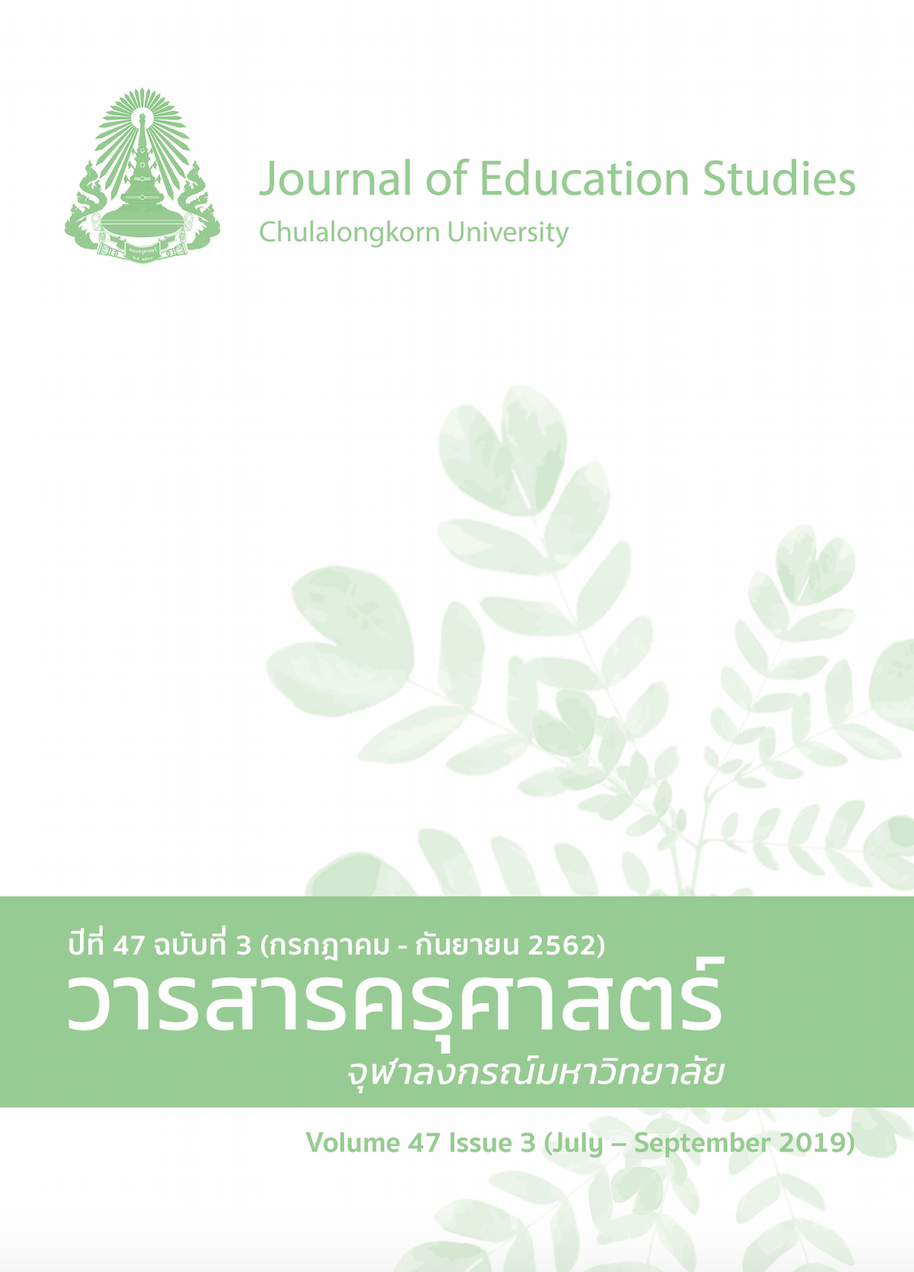Science, Technology, and Society Learning Process Arrangementto Develop Early Childhood Children’s Analytical Thinking
Keywords:
SCIENCE, TECHNOLOGY, AND SOCIETY, ANALYTICAL THINKING, EARLY CHILDHOOD CHILDREN’SAbstract
The research objectives were 1) to design experience learning plan through science, technology, and society learning process arrangement, 2) to study the outcome of early childhood children’s analytical thinking through science, technology, and society learning process, and 3) to study early childhood children’s science learning through science, technology, and society learning process. The target group used in this research was 35 young children, who were purposively selected, in the class of Kindergarten 2/8 academic year 2016 at Anuban Chiang Mai School. The researcher sets passed criteria evaluation at 70.00%.
The results found that: 1) new science, technology, and society experience lesson plans were created; and 2) the target group, who learned through science, technology, and society experience lesson plans, received the mean score at 92.85% which was higher than the set criteria of 70.00%. Overall, they had got mean scores of critical thinking higher than the set criteria, which grouping was the most rated (100%), following with estimating (96.71%), correlating (91.42%), comparing (89.28%), and surveying (87.86%) respectively; and 3) the target group who learned through science, technology, and society experience lesson plans earned the mean scores of science learning at 93.14 % which was higher than the set criteria of 70.00%.
References
ภาษาไทย
กระทรวงศึกษาธิการ. (2554). แนวทางการประเมินคุณภาพตามมาตรฐานการศึกษาปฐมวัยเพื่อการประกันคุณภาพภายในสถานศึกษา. กรุงเทพมหานคร: โรงพิมพ์สำนักงานพระพุทธศาสนาแห่งชาติ.
กุลยา ตันติผลาชีวะ. (2551).รูปแบบการเรียนการสอนปฐมวัยศึกษา.กรุงเทพมหานคร: เบรน-เบส บุ๊ค.
เกรียงศักดิ์ เจริญวงศ์ศักดิ์. (2553). การคิดเชิงวิเคราะห์. กรุงเทพมหานคร: ซัคเซสมีเดีย.
ชนาธิป พรกุล. (2554). การสอนกระบวนการคิด ทฤษฎีและการนำไปใช้. กรุงเทพมหานคร: สำนักพิมพ์แห่งจุฬาลงกรณ์มหาวิทยาลัย.
ณัฐวิทย์ พจนตันติ. (2548). แนวคิดวิทยาศาสตร์ เทคโนโลยี และสังคม. ภาควิชาการศึกษา คณะศึกษาศาสตร์ มหาวิทยาลัยสงขลานครินทร์.
ทิศนา แขมมณี. (2543). การคิดและการสอนคิดประมวลบทความนวัตกรรมเพื่อการศึกษายุทธศาสตร์ในการเรียนรู้. กรุงเทพมหานคร: เดอร์มาสเตอร์กรุ๊ป.
ปราณี กองจินดา. (2549). การเปรียบเทียบผลสัมฤทธิ์ทางการเรียนคณิตศาสตร์ และทักษะการคิดเลขในใจของนักเรียนที่ได้รับการสอนตามรูปแบบซิปปาโดยใช้แบบฝึกหัดที่เน้นทักษะการคิดเลขในใจกับนักเรียนที่ได้รับการสอนโดยใช้คู่มือครู (วิทยานิพนธ์ปริญญามหาบัณฑิต ไม่ได้ตีพิมพ์). มหาวิทยาลัยราชภัฏพระนครศรีอยุธยา, พระนครศรีอยุธยา.
พัดชา เพิ่มพิพัฒน์. (2546). ผลสัมฤทธิ์ทางการเรียนและความสามารถในการนำความรู้วิชาวิทยาศาสตร์ไปใช้ในชีวิตประจำวันของนักเรียนชั้นมัธยมศึกษาปีที่ 2 ที่ได้รับการสอนตามแนวคิดวิทยาศาสตร์ เทคโนโลยี และสังคม (วิทยานิพนธ์ปริญญามหาบัณฑิต ไม่ได้ตีพิมพ์). มหาวิทยาลัยเชียงใหม่, เชียงใหม่.
ภพ เลาหไพบูลย์. (2542). แนวการสอนวิทยาศาสตร์. กรุงเทพมหานคร: ไทยวัฒนาพาณิช.
รพีพร โตไทยะ. (2540). ผลสัมฤทธิ์ทางการเรียนและความสามารถในการแก้ปัญหาวิชาวิทยาศาสตร์ของนักเรียน ชั้นมัธยมศึกษาปีที่ 1 ที่ได้รับการสอนแบบแก้ปัญหาตามแนววิทยาศาสตร์เทคโนโลยีและสังคม (วิทยานิพนธ์ปริญญามหาบัณฑิต ไม่ได้ตีพิมพ์). มหาวิทยาลัยเชียงใหม่, เชียงใหม่.
รุจิร์ภู่สาระ.(2545). การเขียนแผนการเรียนรู้.กรุงเทพมหานคร: บุ๊คพอยท์.
ศรีสุรางค์ ทีนะกุล.(2542). การคิดและการตัดสินใจ.กรุงเทพมหานคร: เธิร์ดเวฟ เอ็ดดูเคชั่น.
สถาบันส่งเสริมการสอนวิทยาศาสตร์และเทคโนโลยี. (2546). กรอบมาตรฐานและคู่มือการจัดการเรียนรู้วิทยาศาสตร์ปฐมวัย. กรุงเทพมหานคร: โรงพิมพ์ศรีเมือง.
สุภากร พูลสุข.(2546).ศึกษาผลของการจัดการเรียนรู้ตามแนวคิดวิทยาศาสตร์เทคโนโลยีและสังคมต่อความสามารถในการคิดแก้ปัญหาและความพึงพอใจต่อการจัดการเรียนรู้วิชาวิทยาศาสตร์ของนักศึกษา
ประเภทวิชาช่างอุตสาหกรรมวิทยาลัยเทคนิคพังงา (วิทยานิพนธ์ปริญญามหาบัณฑิต ไม่ได้ตีพิมพ์) มหาวิทยาลัยสงขลานครินทร์, สงขลา.
สำนักงานส่งเสริมสังคมแห่งการเรียนรู้และคุณภาพเยาวชน. (2553). การดำเนินงานและเส้นทางอนาคต. กรุงเทพมหานคร: สำนักงานส่งเสริมสังคมแห่งการเรียนรู้และคุณภาพเยาวชน.
ภาษาอังกฤษ
Watson. G., & Glazer Z. E. M. (1964). Watson–Glaser critical thinking appraisal manual. New York: Brace and World Inc.
Wilson, J., & Livingston, S. (1996). Process skills enhancement in the STS classroom. In R. E. Yager (Ed.), Science/Technology/Society as Reform in Science Education (pp. 59-69). NY: State University of New York.



